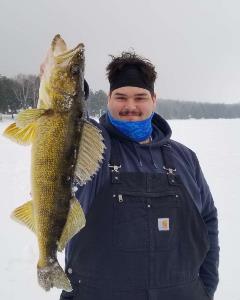Outdoor America 2020 Issue 2
The Izaak Walton League awards two $2,500 national scholarships each year to complement scholarships offered by League chapters and divisions. The national scholarships help educate future conservation leaders by supporting college students pursuing degrees in natural resources and related subjects. These scholarships are made possible and fully funded through a generous annual grant from the Izaak Walton League of America Endowment.
The scholarship review committee selected the following students to receive the League’s National Conservation Scholarships for the 2020-2021 school year.
KATIE GALLETTA
Biology–Concentration in Ecology, Evolution and Marine Biology
Bowdoin College, Maine
.tmb-small.jpg?Culture=en&sfvrsn=9a5cba0d_1)
Conservation Philosophy: "Conservation efforts cannot be truly effective without considering the needs of local people. Community-based conservation takes a lot of work, but I believe that in many cases it is the only way to ensure the continued protection of ecosystems and resources. I have been interested in conservation and topics like citizen science for a while, but my formal introduction to community-based conservation happened when I studied in Tanzania. My focus was on learning different approaches to wildlife management and how ecological and societal aspects of an area dictate the efficacy of different management approaches.”
Critical Conservation Issues: “Although North America is facing many environmental threats, none looms quite so large as anthropogenic climate change [pollution caused by human activity]. However, the impacts of climate change are worsened by other environmental issues that will have severe repercussions for our ecosystems in the future if left unchecked. Of these, habitat loss is simultaneously a driving factor and a result of climate impacts and is therefore extremely important to address. Since even before the colonial era, North America’s ecosystems have been altered to suit human settlement. However, growing populations have increased the need for natural resources and land, causing habitats to become more exploited and fragmented than ever. Continued human development will only exacerbate this unless swift action is taken to conserve and protect habitat.”
More About Katie: Katie will pursue a Ph.D. in wildlife conservation and ecology with a goal to become a staff scientist or educator with a conservation organization. “I want to research the effectiveness of different conservation approaches to find practical, affordable and productive ways to involve regular people in broad-scale conservation efforts.”
ALEXANDER LARSON
Environmental Science
Carroll University, Wisconsin

Conservation Philosophy: “Natural resource management is a huge part of environmental conservation. It has been an incredible experience to learn just how connected our Earth is. It is everyone’s duty to take care of this planet because it’s all that we have. Managing our natural resources helps protect our planet and keep all of its intricate systems together and healthy.”
Critical Conservation Issues: “The biggest issue that we will have to deal with in the next 10 years is climate change. Not only does it include global warming, but also includes many other aspects. A couple of big changes it causes are ocean warming and acidification. These issues may not affect those who live away from the coasts more than those that do, but the effects can be seen almost everywhere. Ocean acidification affects all levels of life in the ocean, from the coral reefs to the deep ocean. Ocean warming allows for this reaction to occur at a faster rate and increase the range of damage caused. It is because of how important the oceans are to our very health, that makes me believe these are our biggest issues, and the ones that may hurt us more in years to come. Not only because of the loss of wildlife, but also loss of such a beautiful ecosystem. Not to mention the oceans are our biggest supply of water, and the more we damage the water we have, the less future generations will have at their demand.”
More About Alexander: Alexander aspires to be a marine ecosystem conservationist and wants to use his education to help protect our natural resources. “So that the future generations can enjoy them as much as I have in my lifetime.”
Know a conservation-minded college student who could use an extra $2,500 for tuition and expenses? The next application cycle begins January 1, 2021 with a deadline of May 15, 2021.
Learn more